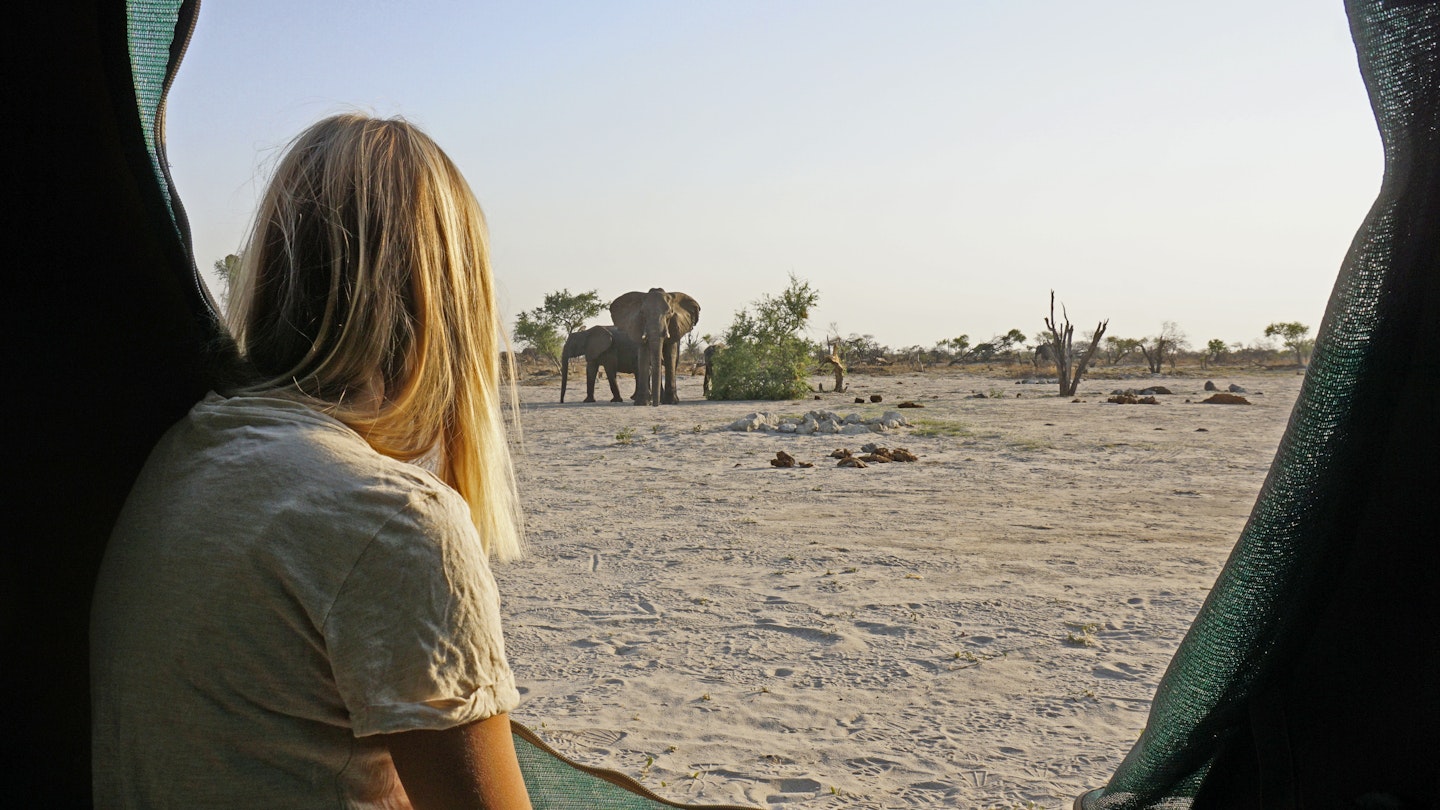Essential Tips for Exploring Botswana
Having driven alone around Botswana and across most of southern Africa, I’ve learned a few things from traveling as a female. The most important lesson? Just go.
From Botswana’s arid south to the Okavango Delta and bountiful Chobe region beyond, this peaceful country is a joy to explore. Here are the top things to know before you visit Botswana.
1. Getting Around is a Challenge: Need for a 4WD Vehicle
Botswana’s best adventures are wild and far from civilization; however, public transport will only get you so far. It’s possible to plan a sedan-friendly road trip on paved roads, but Botswana is known for the allure of its remote wilderness rather than its big cities.
If you’re traveling independently and national parks are on your bucket list, you need a 4WD vehicle and must understand seasonal road conditions.
A fully equipped 4WD is typically rigged with rooftop tents, allowing you to sleep safely away from dangerous animals. These rugged vehicles can be rented in Maun, Kasane, or Johannesburg (South Africa) and generally cost around US$150 per day.
Ask the rental company about the best times to visit specific areas—this answer will often be in the dry season—and clarify their emergency protocols and recovery support.
2. Prepare for Poor Road Conditions
The back roads in Botswana generally aren’t in good condition. If you see a track or dirt road to the left of the main route, the road ahead is likely potholed. Consequently, it’s almost always best to take the unofficial detour.
Stay mindful that distances can often be misleading. Plan extra time into your itinerary to account for slow-going conditions and make room to stop and snap photographs. Utilizing resources like Tracks4Africa and downloading offline map applications can greatly assist in navigating Botswana.

3. Plan for Accommodations in Advance
Luxury stays in faraway locations and self-drive expeditions between remote campsites require a decent amount of advance planning—especially during peak season from June to September.
During the high travel months of July and August, campsites fill up quickly with international travelers and locals. Campgrounds inside national parks are limited and typically need direct contact for reservations.
4. Carry Physical Proof of Your Plans
Due to limited cellular signal and connectivity in remote areas, it’s essential to carry printouts of your reservations. Ensure you also have cash in local currency (pula) to pay for park fees.
5. Duration of Stay in Botswana
Most safaris start either in Maun or Kasane. With a week or less, maximize your experience by flying into a lodge or camp. Spending three nights in one location is ideal to fully immerse in the environment without feeling rushed.
If you have ten days or more, consider a road trip; however, planning to take in all wildlife hotspots can make the journey feel rushed.
6. Travel Solo in Off-Peak Seasons
Traveling solo can often be easiest during low season, from November to February, when prices drop. Although the “green season” may present challenges for self-driving due to muddy conditions, booking a high-end lodge can still provide ample experience without the hassle.
7. Understanding the Seasons
Water levels are at their highest in the Okavango Delta during July and August. This is also a peak time for safaris, so plan your trip carefully if you wish to explore this area by traditional mokoro (canoe).
8. Greet People in Setswana
The Batswana give great importance to greetings. It’s respectful to address everyone, starting with the elders, to foster goodwill.
9. Dress Appropriately in Rural Areas
While many tourist locations follow Western dressing norms, adherence to modesty, such as wearing skirts that cover the knees, is recommended in rural areas.
10. Comfortable Clothing for Safari
Wearing neutral-toned clothing is advisable for safaris, as bright colors can distract the wildlife.
11. Pack for Temperature Variations
Layer your clothing to accommodate for chilly mornings and evenings in Botswana. Pack a warm coat and swimwear for the hotter afternoons.
12. The Value of Binoculars
A good pair of binoculars can enhance your wildlife viewing experience significantly. Aim for specifications of 8×40 or 10×42 to make the most of your trip.
13. Tipping Etiquette
It’s customary to tip lodge staff and safari guides when service is satisfactory. Typical tips range around US$15 per day for guides.
14. Cultural Considerations
Women traveling alone may face inquiries about their relationship status. It’s advisable to consider wearing a wedding band to deter unwanted advances.
15. Avoid Driving at Night
Be cautious while driving, particularly at night, due to wildlife on the roads, including donkeys and elephants.
16. Managing Foot-and-Mouth Disease Risks
To curb the spread of foot-and-mouth disease, it is essential to disinfect footwear regularly, especially when crossing boundaries between rural and wilderness areas.
17. Drinking Water Precautions
Although tap water in towns is generally safe, it’s wise to consider bottled water, especially in remote campsites.
18. Insect Precautions
Malaria is prevalent; hence, using effective insect repellent is crucial for a comfortable stay.
19. Be Aware of Petty Theft
While Botswana is relatively safe, instances of petty theft can occasionally occur, particularly around campsites and urban areas.
This article was first published Sep 7, 2022, and updated Oct 22, 2023.




